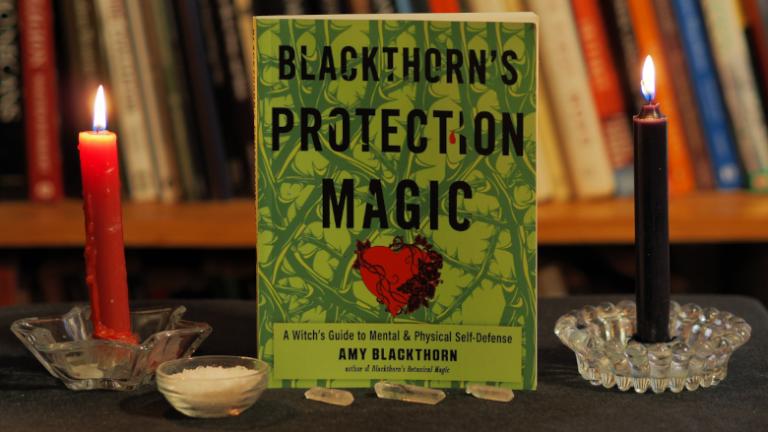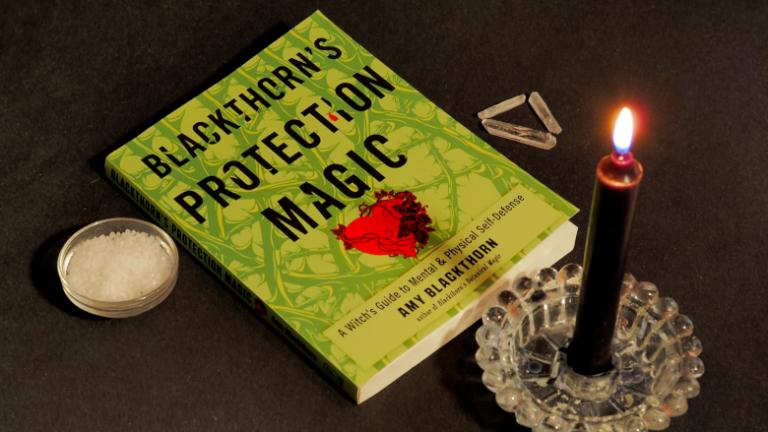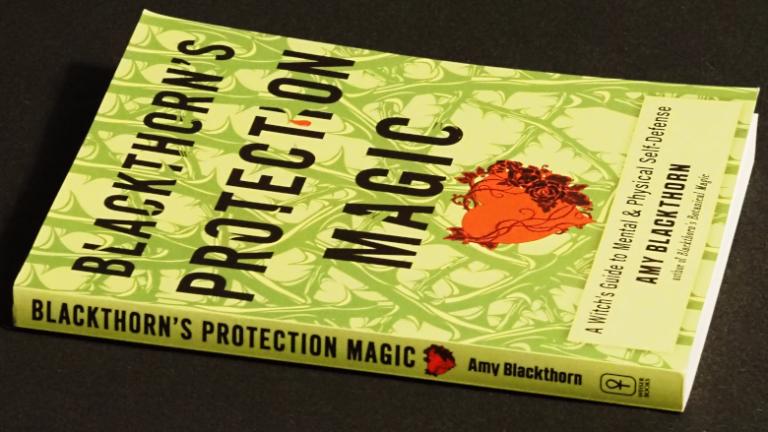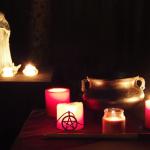Blackthorn’s Protection Magic: A Witch’s Guide to Mental and Physical Self-Defense
by Amy Blackthorn
Published by Weiser – March 2022
208 pages
Paperback: $16.95, Kindle: $9.99
The most effective magic combines spellcasting and other arcane activities with tangible, this-world actions. If you can do something with 100% reliability then you don’t need magic, but if things are the least bit uncertain then magic can improve the odds that things will work out your way. And conversely, even if something seems so difficult that magic is your only hope, taking even a few steps in the direction of your goal makes it more likely you’ll manifest it.
This is the value of Amy Blackthorn’s book Blackthorn’s Protection Magic: A Witch’s Guide to Mental and Physical Self-Defense. It covers the protective properties of stones and herbs, how to use Tarot cards as a focus for protection spells, and some very effective “don’t see me” spells (I’ve used similar spells before with good results). And it also covers how to escape from duct tape and zip ties, and what to do if you think you’ve got a stalker.
This book is exactly what you would expect from someone who is a witch, an aromatherapist, and a purveyor of magical teas, and who also has a background in executive security and is a certified firearms instructor. Amy knows the mundane and magical sides of protection and she shares her knowledge of both in this concise guide.
Thinking through self-defense in advance
The book begins where it should – on ethics. Some protection is passive, but other protection is active. Whether you’re using magic or mundane methods, you may have to hurt someone to protect yourself. Are you OK with that? If not, have you considered the consequences of your pacifism? If you are, have you considered the consequences (physical, emotional, legal) of doing violence? The time to think about these things is now, before you have to make a life-altering choice in a split second.
Honestly, so much of protection and security comes down to this: think through these things in advance. What might go wrong, who might try to harm you, and what can you do if that happens? You need not – and in my opinion, should not – go as far as former Marine Corps General and Secretary of Defense James Mattis, who said “have a plan to kill everybody you meet.” You do need to practice learning to spot threats, and especially practice responding to them.
As Amy says in the chapter on personal security:
We don’t rise to the challenge; we fall back to our lowest level of training. Every time.
And also:
I fully believe in encouraging a society where instead of admonishing women not to be assaulted, we teach everyone consent. Sadly, that is not the world in which we currently find ourselves.
I occasionally see social media posts that say “don’t teach your daughters how to not get raped – teach your sons to not rape.” Why would any reasonable and concerned parent not do both?
The most compelling section of the book is titled “My Self-Defense Story.” Amy begins with a content warning that says “firsthand survivor account of stalking and attempted murder.” I won’t begin to summarize it – I couldn’t do it justice. I’ll just say it’s a real life account of how sometimes “the system” works and how many times it doesn’t, so you have to take responsibility for your own protection – or you die, and die badly. Amy describes how not to die, from personal experience.
A checklist for evaluating curses
As you would expect from a book bearing the subtitle “A Witch’s Guide” Blackthorn’s Protection Magic covers plenty about magical attacks. My last post included the section “you probably haven’t been hexed.” In a Facebook comment, Cat Heath said I was underplaying the risk from hexes and curses. In my experience most people who think they’ve been cursed haven’t. But I respect Cat’s experience and expertise, and she was right to point out such things can happen and we need to be prepared for them.
Cat didn’t know I was reading this book, but she recommended Amy’s Curse Threat Assessment checklist in it. And on that, Cat and I are in complete agreement.
This is a list of symptoms of curses, hexes, and jinxes. If you’ve got three or less, it’s probably just a run of bad luck. If you’ve got four to six, it’s possibly a jinx – which Amy defines as passive, low-level negative energy. If you’ve got seven to nine, it probably is a curse. And if you’ve got ten you need professional help, likely both magical and therapeutic.
Who should read this book?
For Pagans, witches, and other magical practitioners, Blackthorn’s Protection Magic presents essential skills and knowledge to help you deal with the threats to your mental, physical, and spiritual health that will come your way sooner or later. It’s an ideal first book on the subject for new practitioners, and it’s useful for those of us who’ve been doing these things for many years.
For skeptics and those who choose to avoid magic (for whatever reason) the book provides helpful guidance on how to avoid the kind of ordinary crime that can strike anyone, and how to deal with it if it does.
Which is to say, anyone will benefit from reading Blackthorn’s Protection Magic.
Reviewer’s notice
Weiser sent me a review copy of this book. As always, I review what I want to review and I give you my honest opinion. Amy is friend and a colleague and I hope this and all her books do well, but my only obligation is to you, the reader. This is my honest opinion of Blackthorn’s Protection Magic. I’ll be referring to it in the future in my own practice, and I will definitely be referring it to others.
If you’re looking for a book on protection magic, start here.




















